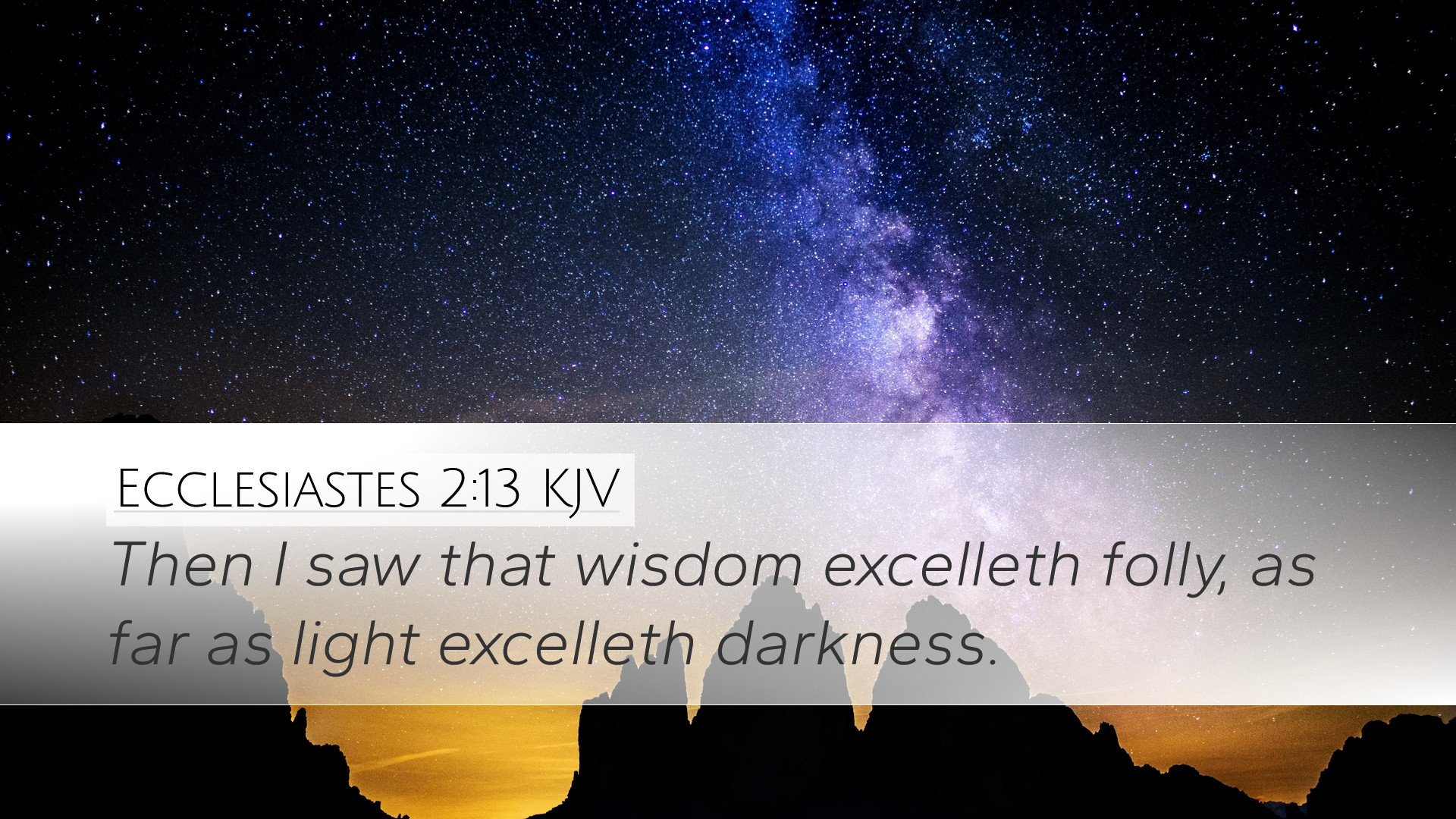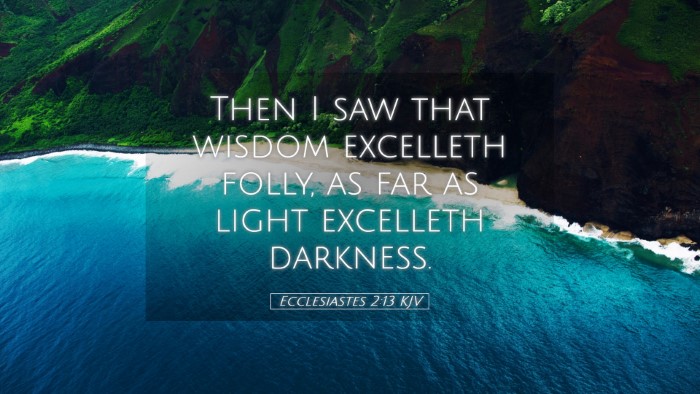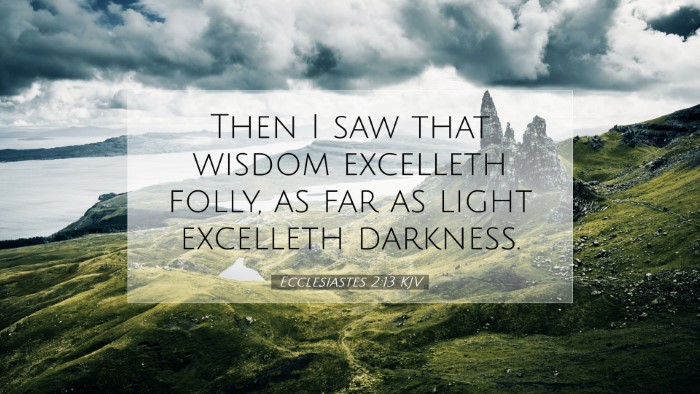Commentary on Ecclesiastes 2:13
Verse Text: "Then I saw that wisdom excelleth folly, as far as light excelleth darkness."
Introduction
The book of Ecclesiastes, traditionally attributed to Solomon, delves into the pursuit of meaning in life amid the futility of worldly endeavors. Ecclesiastes 2:13 encapsulates a pivotal reflection in this search—a contemplation on the nature of wisdom compared to folly. This commentary draws insights from esteemed public domain works by Matthew Henry, Albert Barnes, and Adam Clarke, facilitating a deeper understanding suitable for pastors, students, theologians, and Bible scholars.
Contextual Analysis
Ecclesiastes presents the “Preacher,” who engages in a philosophical examination of life’s purpose. In the preceding chapters, the futility of human efforts, wealth, and pleasure is contrasted with the enduring value of wisdom. This verse is essential as it marks a turning point in understanding the intrinsic benefits of wisdom.
Matthew Henry's Insights
- Wisdom Versus Folly: Henry emphasizes that wisdom transcends folly like light overshadowing darkness. He mounts a moral examination, showcasing wisdom’s profound impact on human life, leading to better decision-making and a more fulfilling existence.
- Practical Advantages: According to Henry, wisdom elucidates circumstances that folly obscures; it grants clarity and direction, illuminating paths of righteousness, in stark contrast to the confusion and chaos that folly yields.
- Divine Wisdom: Henry draws attention to how divine wisdom, particularly through a relationship with God, enriches human understanding. Thus, wisdom is not merely intellectual but profoundly spiritual.
Albert Barnes' Contributions
- Nature of Wisdom: Barnes notes that the breadth of wisdom isn’t solely in its knowledge but also in its application. He regards wisdom as a moral guide, steering individuals away from destructive behaviors associated with folly.
- Social Implications: The implications of wisdom extend to societal dynamics, imparting order, stability, and peace, creating a societal fabric vastly superior to the chaos sown by folly.
- Comparison of Outcomes: Barnes underscores that the effects of wisdom yield positive outcomes in life, while those indulging in folly often reap frailty and disillusionment, aligning himself with the overarching theme of Ecclesiastes regarding the results of human endeavors.
Adam Clarke's Observations
- Cognitive and Spiritual Dimensions: Clarke posits that wisdom not only enlightens the mind but also elevates the spirit, presenting it as an ever-essential quality in overcoming life’s burdens.
- Value Beyond Comparison: He encourages readers to recognize that understanding and sound judgment are invaluable, far surpassing material wealth or pleasure found in folly.
- Long-term Perspective: Clarke’s interpretation highlights that the pursuit of wisdom is a long-term investment with enduring returns, in stark contrast to the fleeting satisfaction of pleasures derived from folly.
Thematic Reflections
Ecclesiastes 2:13 elucidates several themes that resonate throughout Scriptural discourse:
- Knowledge and Revelation: The relationship between knowledge, wisdom, and the divine is underscored throughout Scripture. This verse implies that true wisdom reveals God’s character and purposes.
- Illumination versus Ignorance: The metaphor of light and darkness serves not only as a physical distinction but also a spiritual and moral dichotomy. Light symbolizes life, understanding, and God’s grace, whereas darkness represents death, ignorance, and separation from God.
- Value of Wisdom in Ministry: For pastors and leaders, this passage encourages the pursuit of wisdom in shepherding communities, calling for discernment and insight in addressing the complexities of life and faith.
- Existential Inquiry: The ongoing quest for meaning is central to the human experience. Ecclesiastes invites an examination of where true fulfillment lies, often contrasting societal values with the profound truths found in God’s wisdom.
Practical Applications
In considering Ecclesiastes 2:13, several practical applications emerge for personal life and ministry:
- Pursuit of Wisdom: Encourage a lifestyle conducive to acquiring wisdom—through study, prayer, and communal support in faith-generating activities.
- Discernment in Decisions: Emphasizing the importance of wise decisions can guide individuals and congregations toward choices that align with God’s will, leading to flourishing lives.
- Education and Teaching: In the context of Christian education, instructors should prioritize imparting wisdom that transforms mindsets and hearts, embedding the significance of biblical wisdom in curricula.
- Community Leadership: Leaders should advocate for wisdom in governance and community life, establishing practices that reflect the principles espoused in this profound verse.
Concluding Thoughts
Ecclesiastes 2:13 serves as a powerful reminder of the transcendent value of wisdom over folly. It calls one to reflect on the nature of one’s pursuits and the eternal truths reflected in the pursuit of wisdom. As highlighted by the insights from Henry, Barnes, and Clarke, wisdom is not merely an intellectual asset but a transformative force that enables individuals to engage meaningfully with God, others, and themselves.
In conclusion, embracing the preeminence of wisdom as portrayed in this verse invites deeper engagement with scriptural truths, fostering a life marked by clarity, purpose, and divine alignment.


